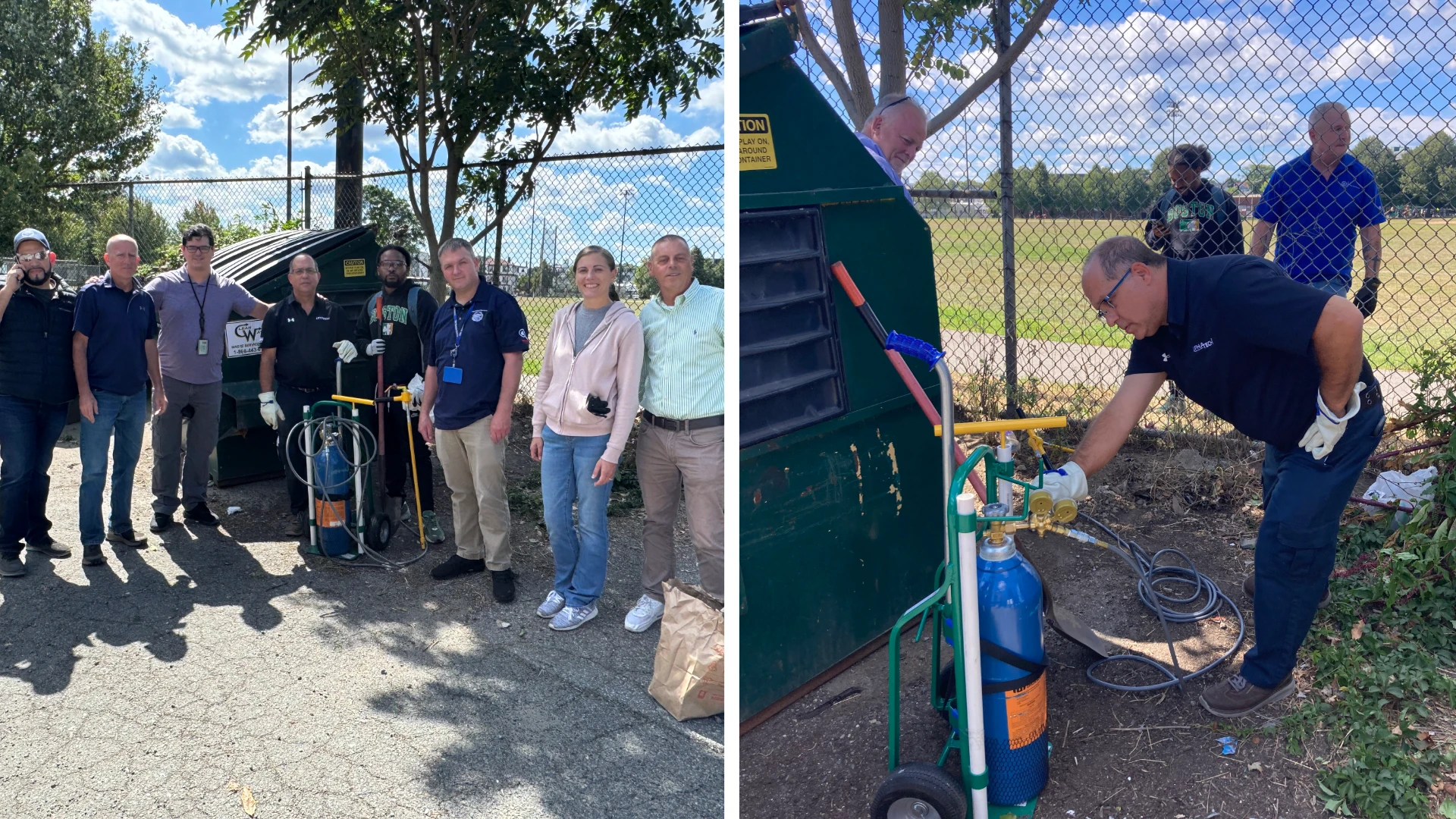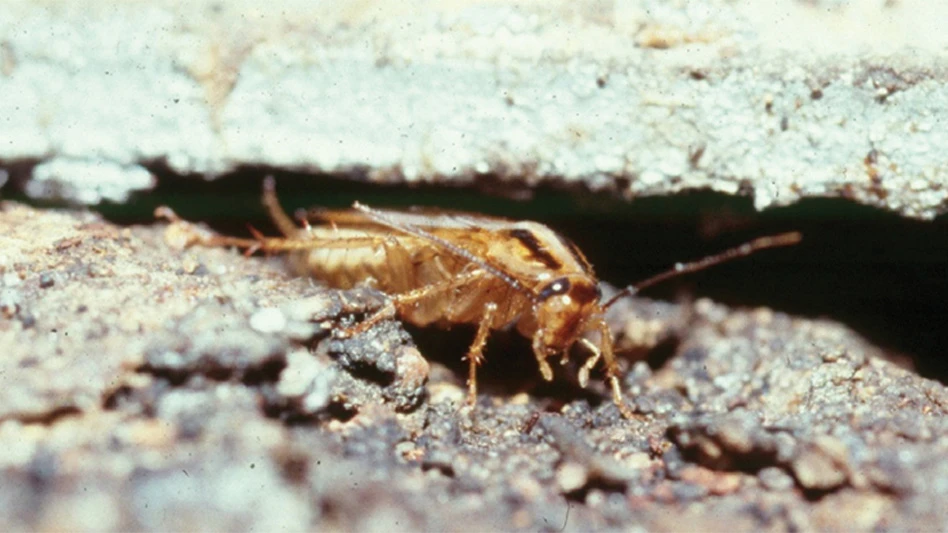Univar Acquires Overseas Distributor; Strengthens International Presence
REDMOND, WASH. — Acting on its commitment to expand internationally, Univar recently signed an agreement to acquire the Quaron Group, a distributor of chemicals in Belgium, France and the Netherlands.
"We are pleased to announce an agreement to add the Quaron Group to Univar’s widely recognized ‘best in class’ distribution, sales and marketing organization," said John Zillmer, Univar CEO. "The combined organizations will provide Univar’s supplier partners with greater opportunities for sales growth and technical service for their customers. For our customers, the acquisition offers better product selection and enhanced value-added services from our strong logistics platform."
"Combining Univar’s and Quaron’s activities in the Netherlands, Belgium and France is a logical fit in this market," added John Regout, CEO of Quaron. "The expected synergies will mean even better service to customers."
The acquisition is subject to regulatory approval by the EU Commission.
Univar, a well-known name in the structural pest control industry, boasts more than 60 professional service centers across the country. The company’s North American Pest Management Operations are led by John Bolanos, vice president, Professional Products & Services, a 33-year veteran of the industry. Bolanos has been given the responsibility of expanding Univar’s footprint in Mexico, South America and the Middle East, in addition to overseeing its Professional Products business in the U.S. "It’s a very exciting opportunity that ultimately will benefit all of our pest control markets," he said.
In January, Univar also named Chris Wescott to the position of director — PP&S international and export business. In this newly created position, Wescott will direct and manage the growth and expansion of Univar’s business outside the United States.
Over the course of the last several years, Univar has pursued more opportunities in the export and international segments of its Professional Products and Services business. "Chris has played an important role in developing and driving opportunities with our current export business," Bolanos said. "His strong skill sets in team building, execution of strategy, and building sustainable alliances with suppliers will be an important asset as he takes this business to the next level."
Quaron was created in 2003. It exports chemical products to more than 30 countries. Univar is one of the world’s leading distributors of industrial and specialty chemicals. It represents more than 2,500 chemical producers and provides its customer base, made up of 250,000 customers, with a full portfolio of products. In all, Univar operates a network of approximately 170 distribution centers throughout North America, Europe and China.
******
New Book Focuses on
Stored Product Pests
WESTFIELD, Ind. — A new book by author and entomologist David Mueller, Reducing Customer Complaints in Stored Products, compiles knowledge from a career of experiences to help build a modern pest management program that improves customer satisfaction by reducing customer complaints.
Mueller describes insects and mice as symptoms of specific environmental conditions, including temperature, relative humidity, food sources, sanitation conditions, nesting material, and predator pressure. Their populations can be managed by changing their environmental conditions or applying a chemical to control them. However, the first priority is finding their likes and dislikes. When offered conditions they do not like, the pests will leave or they will die. Knowing the pest is half the battle in controlling it, Mueller says.
The book includes dozens of illustrations, case studies, and practical tips from real life experiences. These case studies and practical tips come from a stored product entomologist who has traveled the world during his career helping companies solve customer complaints.
Chapters in this 335-page, fully illustrated, hardback book include "Reducing Customer Complaints;" "Pests Associated with Stored Products;" "Next Generation Rodent Management;" "Case Studies, Practical Tips, and Solutions;" "Organic Pest Management;" "Pheromones;" and "Mating Disruption." The book can be ordered at www.insectslimited.com or by calling 800/992-1991. It also is available in the PCT bookstore.
*****
Jack O’Reilly, Former Owner of Apex Pest Control, Dies
MINNEAPOLIS — Jack O’Reilly, former owner of Apex Pest Control in St. Paul, Minn., and a retired director of Plunkett’s Pest Control, died on December 25. He was 82.
O’Reilly spent his career in the pest management industry and was one of the first students of Dr. John Osmun at Purdue University. The two remained close friends throughout his life. O’Reilly graduated from Purdue in 1953 with a degree in entomology. O’Reilly also served in the United States Navy for four years beginning in 1945.
After Purdue, O’Reilly went to work for Plunkett’s Pest Control in Minneapolis, a firm owned and operated by his uncle, Bill O’Reilly. In 1956 he began managing Apex Pest Control, the St. Paul arm of the Plunkett’s business, eventually purchasing the company in 1968. He ran the business for more than 30 years in all, selling Apex back to Plunkett’s in 1985. O’Reilly then returned to Minneapolis, where he became Plunkett’s first technical director. Four years later he announced his semi-retirement, moving into a part-time position at the company. O’Reilly retired fully from the business in 1992.
Plunkett’s Technical Director Jay Bruesch recalls working with O’Reilly throughout his career, as well as during the three years when O’Reilly worked as his mentor. "I first met Jack when I got into the pest control industry in 1982," says Bruesch. "Our two companies were somewhat close."
After O’Reilly announced his semi-retirement in 1989, he spent some time helping to develop the company’s next technical director, who was Bruesch. "He ran the supply room and for an hour or two at the end of the day he’d come up and work alongside me, teaching me entomology," Bruesch recalled. "If I was having problems with tracking insect IDs and needed to know something, Jack would coach me on those things."
Bruesch also recalls how O’Reilly directly influenced his life. "He taught me the human side of the business," says Bruesch. "He taught me to spend time with people and listen to people and get to know their full story. Jack was the most sympathetic, empathetic, nicest man I’ve ever known in this industry."
A board member of the Minnesota Pest Management Association (MPMA), O’Reilly also had served as president of that organization and won a MPMA Hall of Fame Award. He was also a member of industry fraternity Pi Chi Omega.
Friends and relatives recall O’Reilly’s genuine concern for others. At his retirement party, one of O’Reilly’s competitors in the pest control industry marveled that he had worked in a competitive industry for 40 years and retired without having made a single enemy.
O’Reilly died on Christmas Day, almost one year after the death of his wife, Lori, to whom he was married for 56 years. The couple enjoyed entertaining family and friends in their home, and friends recall that most events included a party game of O’Reilly’s own creation.
O’Reilly is survived by four children, seven grandchildren and two great-grandchildren.
Editor’s note: John O’Reilly (cousin) and Jay Bruesch contributed to this story.
******
Comings & Goings
Univar USA has named Chris Wescott to the position of director, professional products and services international and export business. In this newly created position, Wescott will direct and manage the growth and expansion of Univar’s business outside the United States.
Massey Services, Orlando, Fla., promoted Ed Dougherty to executive vice president of consumer services. In this role, Dougherty will oversee all residential service center operations.
Joey Harris and Brian Cook have been elected to the board of directors for Cook’s Pest Control, Decatur, Ala., effective Jan. 1. Harris has been employed by Cook’s since 1988 and recently was promoted to chief operating officer. Cook began his employment with the company in 2008. He is a shareholder and currently serves as customer care manager.
Cook’s also announced that Robert Humphreys is filling the newly created position of director of training. Along with leading the firm’s overall training efforts, Humphreys will develop and monitor a management training program for the company.
The entire operations management team of Milwaukee-based Wil-Kil Pest Control has passed the Associate Certified Entomologist exam, a certification offered by the Entomological Society of America. As a result, Wil-Kil now has a total of 20 associate certified entomologists (ACEs) on staff. ACEs generally specialize in pest control and have passed at least one rigorous examination to test their knowledge. ACEs also agree to ascribe to a code of ethical behavior and, as part of their certification renewal process, must provide a copy of a current pesticide applicator’s license each year.
Wil-Kil’s ACE’s include: John Aeschlimann, Randy Allen, Dale Bauerkemper Brad Bergum, Ben Blahnik, Gary Checkai, Robert Duell II, John Fortuna, James Gilbert, Scott Huntley, Thomas Majors, Ray Olschewski, Andrew Ruffi, James Schmitt, Bud Schultz, Joseph Simmons, Larry Smith, Joseph Tauchen, Russell Uttech and Shane McCoy.
THOMCO announced in January the promotion of John Clark and Monica Clark (not related) to senior vice president. THOMCO, a national program administrator headquartered in Kennesaw, Ga., announced the promotions in recognition of their expanded duties and as part of a long-term succession strategy.
******
Residex Relocates Corporate Headquarters
ROSELLE, N.J. — Residex moved its corporate headquarters from Cranford, N.J., to Roselle, N.J. The new, smaller headquarter facilities is designed to allow the East Coast distributor to better position itself to its central New Jersey customer base and take advantage of greater logistical efficiencies gained by a new software system. The new location, 248 Cox Street, Roselle, N.J., features a state-of-the-art customer service center and enhanced walk-in area for pest management professionals.
President Chris Donaghy commented, "This move and restructuring will reflect our culture and identity as a pacesetter in distribution. By embracing technology we are able to better serve our customers and improve our work environment for our employees." Donaghy said several executives will telecommute, and the company has moved inventory to their 17 branch locations to allow for a smaller corporate headquarters and central distribution center.
"This relocation will result in Residex having a smaller carbon footprint as we eliminate the need for several employees to commute daily and reduce transportation by stocking inventory at the branch level where it is needed versus at a central location," said Jim Hespe, Residex vice president and general manager. "We will also save on the costly rent of a large facility in an expensive geographical area."
In other company news, Innolytics announced the company added Residex to their portfolio of distribution partners. "Customers continue to multiply and we need more help with distribution," said Erick Wolf, CEO of Innolytics. Now registered in all 50 states, OvoControl P, the "birth control" for pigeons, continues to gain increasing acceptance and support from the pest control community, according to the company.
*****
BASF’s Ant Institute Web Site Offers Consumer Information, Promotes PMP Services
ST. LOUIS — Homeowners can find ant prevention tips and how to get professional help eliminating ants at the Ant Institute (www.antinstitute.com), BASF’s new and improved Web site resource.
Building on the popularity of the company’s Termite Institute, the Ant Institute gives homeowners advanced information about America’s No.1 pest.
"Ants are a common problem in every region of the country," said Jason Meyers, technical specialist with BASF. "This Web site provides visitors with a complete portfolio of ant-related information in one central location."
The Ant Institute site includes an "Expert" section with articles written by BASF ant specialists and includes the "Ask an Expert" section where homeowners can enter in a question and one of the company’s specialists will respond. The site also hosts a "Find a Professional" section where homeowners can enter their zip code and get a list of pest management professionals in their area. The site is regularly updated with the latest information on ants and control methods, expert articles and more.
*****
DATE BOOK
March 23: BASF Skill Development Seminar featuring Jeff Tucker, Ellington Agricultural Center (Tennessee Department of Agriculture), Nashville, Tenn. Contact: www.pestcontrol.basf.us or call 800/777-8570, ext. 4276.
March 24: BASF Skill Development Seminar featuring Jeff Tucker, Wynfrey Hotel, Birmingham, Ala. Contact: See March 23.
March 25: BASF Skill Development Seminar featuring Jeff Tucker, The Columns Banquet & Conference Center, St. Charles, Mo. Contact: See March 23.
April 20-21: Pest Control Operators of California Legislative Day, Sacramento. Contact: 916/372-4363 .
April 27-28: United Producers, Formulators and Distributors Association spring conference, Westin Stonebriar, Frisco, Texas. Contact: 770/417-1418 or valera@gpca.org.
May 11-13: Methyl Bromide and Alternatives: Past, Present, and Future, hosted by the Department of Grain Science and Industry, Kansas State University, Manhattan, Kan. Contact: Michelle Hartzer, mkaczmar@k-state.edu or Bh. Subramanyam, sbhadrir@k-state.edu.
May 16-19: National Conference on Urban Entomology, Portland, Ore. Visit: http://ncue.tamu.edu/.
******
PCO News
Dodson Pest Control, Lynchburg, Va., was honored as the "Outstanding Philanthropic Company" of 2009 by the Virginia Piedmont Chapter of the Association of Fundraising Professionals.
Jackson Pest Management, Fort Wayne, Ind., was voted "Best Pest Control Company" in the "2009 Readers’ Pick Best Of" program, sponsored by The News-Sentinel, The Journal-Gazette and FortWayne.com. Jackson Pest Management is led by Bob Jackson and son Rob.
Dodson Pest Control, Lynchburg, Va., also recently received the Pro Patria Award from the Department of Defense. The award is the highest state-level honor given to a civilian employer by the Department and is presented to employers demonstrating exceptional support for national defense by adopting personnel policies that make it easier for their employees to participate in the National Guard and Reserve.
M.A.D. Exterminators, Norristown, Pa., was named Best Pest Control Company in Montgomery County by the Times Herald Newspaper’s Best of Montco 2009 Awards.
Joseph Edwards, CEO of J. Edwards Services, Atlanta, Ga., acquired North Fulton Exterminating in Alpharetta, Ga. Edwards is a former executive vice president of mergers and acquisitions as well as new business development for Arrow Exterminators.
Anderson Pest Solutions, Elmhurst, Ill., brought its Insect Zoo to the DuPage Children’s Museum’s Art Studio, Naperville, Ill., in November, so that guests could interact with live insects and find out how they contribute to the environment. Insects included Hercules beetles, giant lubber grasshoppers, and a giant pumpkin millipede. The insects proved to be a big hit, particularly for the children in attendance.
******
University of Kentucky: Bed Bug Resistance To Insecticides is Widespread and Growing
In a recent study, entomologists at the University of Kentucky College of Agriculture found the majority of bed bugs in the United States appear to have developed genetic mutations, making them resistant to the most commonly used insecticides called pyrethroids.
While there are many different types of pyrethroids, UK researchers have found once a bug is resistant to one, they are likely resistant to others in the same category.
Their findings will be published in an upcoming issue of the Archives of Insect Physiology and Biochemistry, a leading academic journal.
Fang Zhu, a post-doctoral fellow at the University of Kentucky, along with fellow UK entomologists Mike Potter, Ken Haynes and Reddy Palli and several students, analyzed 110 bed bug populations from across the United States and found 88 percent of them had one or two genetic mutations. These mutations produce what is known as knockdown resistance, meaning the insecticide is not able to kill bed bugs.
"This study shows how widespread the problem is. It really brings home that this isn’t just an isolated incident," Palli said.
Scientists in other countries have also found pyrethroid resistance in bed bugs on a smaller scale, so the resistance could be worldwide.
Potter said one of the reasons for the resistance could be that the bed bugs were previously exposed to pyrethroids before coming to the United States. Pyrethroids are used to combat many different insects and are used in mosquito bed nets to combat malaria.
Another possibility is the bugs developed resistance in the 1940s and 1950s when DDT was used for bed bug defense. Bugs that are resistant to DDT have the same target-site resistance as pyrethroids, Haynes said.
Currently, no insecticide or non-chemical practice alone is 100 percent effective in eliminating bed bugs.
"We need alternative insecticides to fight this bug," Potter said, "Unfortunately today’s products are not as effective as ones we had previously. Non-chemical measures are important but are seldom completely effective and can be laborious and expensive. History has taught us insecticides are a crucial part of the bed bug solution."
Data from this study will help pest management professionals make future decisions.
"The methods and primers developed by this group could be used to tell pest control professionals whether or not pyrethroids work on certain bed bugs by looking for these genetic mutations in the bugs’ DNA," Palli said. "If it’s a target-site mutation, like the majority of these, spraying probably would be ineffective, but if it has another type of resistance, we could possibly add synergists to the current insecticide to help fight them.
*****
Arkansas Meeting Promotes Education, Professionalism
NORTH LITTLE ROCK, ARK. — Approximately 150 pest management professionals interested in enhancing their industry knowledge and learning about the latest product innovations traveled to the Wyndham Riverfront Hotel in North Little Rock last year to attend the Arkansas Pest Management Association’s Training Session and Recertification Course. The two-day event included sessions on such diverse topics as fly control, improving results through improved communications, on-the-job safety, ACE Certification, and bats.
Leading off the program was John Fortino of Bayer Environmental Science, who discussed the topic of fly control. Fortino said technicians need to ask themselves four key questions when approaching a fly problem at an account:
- What are the fly species you’re dealing with?
- Where are they coming from?
- Why are they here?
- What are you going to do to control them?
By successfully addressing these four questions, virtually any fly problem can be resolved. The key, he said, is to take an "integrated approach" to the problem. Identify the species causing the problem, "treat the source and not just the symptoms," and utilize time-tested IPM techniques to eliminate the population (i.e., sanitation/source reduction, mechanical controls, baits, sprays, drain cleaners, electronic fly traps, etc.).
In wrapping up his session, Fortino said fly control is a "growth market" so PMPs need to "keep an open mind for business opportunities" when visiting an account or conducting an inspection.
Another popular session during the annual event was a presentation by Dr. Bob Davis of BASF Pest Control Solutions who spoke to technicians about the benefits of ACE Certification. ACE — an acronym for Associate Certified Entomologist — is a new certification option from the Entomological Society of America (ESA) geared specifically toward the pest management industry. Launched in May 2004, the ACE program is a popular continuing education option for career-minded pest management professionals.
"In today’s increasingly complex and highly specialized economy, credentials are everything," Davis observed. That’s why the ACE program is so attractive to those interested in career advancement. "You know you’ve got the skills to do the service, but how do you convince potential customers and maybe even employers (that you have those skills)?" he asked. One way is through a third-party certification program like ACE.
The ACE program makes entomological certification possible for those without formal education in entomology. "If you have extensive experience and knowledge in entomological pest management through on-the-job training, experience and self study, you may qualify to become ACE-certified," Davis said. Anyone can become an ACE, as long as they have a minimum of seven years of verifiable pest management experience, a current pesticide applicator’s license, and the ability to pass a test exhibiting their structural pest control knowledge. To learn more about the program, visit www.entsoc.org or visit the "Frequently Asked Questions" section of the ESA site at www.entsoc.org/certification/ace/faq/index.htm.
During the general membership meeting following the APMA training session, new officers and directors were elected. The slate of officers for 2010 include: Randy West, West Termite & Pest Management, president; Justin McCauley, The Bug Man, vice president; Shannon Hyde-Prince, Hyde’s Termite & Pest Control, secretary; and Phil Bennett, The Bug Man, immediate past president.
Regional directors include Dallas Hopper, Hopper Termite & Pest Management; Bobby Joe Hyde, Hyde’s Termite & Pest Control; Glynn Adams, Adams Pest Control; Stan Lawrence, (company affiliation); and John Force, John Force Pest Control. At large board members are Charles Hartsell, Tim Adams, (company affiliation); Waymon Long, Eagle Pest Management; and Steve Adams, Adams Pest Control. The 2010 allied representative is Dennis Dykes of Estes, Inc.
Co-chairs of the APMA Training Session and Recertification Course included Shannon Hyde-Prince, Beth Golden and Christian Wilcox.
To learn more about future meetings being sponsored by the Arkansas Pest Management Association or to join the organization, visit www.arkansaspest.org or contact Executive Director Anne Fuller at 501/224-4840, apma@bestmanagement.net. — Dan Moreland

Explore the March 2010 Issue
Check out more from this issue and find your next story to read.
Latest from Pest Control Technology
- In Memoriam: Joe Cavender
- Liphatech Adds Alex Blahnik to Technical Team
- Do the Right Sting: Stinging Insect Identification, Management, and Safety
- VAGA's 8th Annual Veterans Thanksgiving Appreciation Dinner
- Clark's Blair Smith on the Response to Increased Dengue Fever Cases in Southern California
- WSDA, USDA Announce Eradication of Northern Giant Hornet from U.S.
- Ned’s Home Acquires Ultra Safe Pest Management
- Bed Bugs & Dirty Clothes





